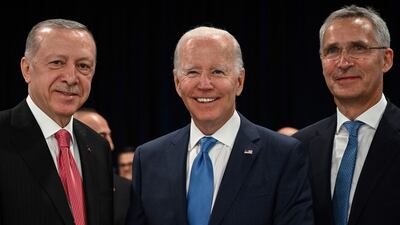Turkey’s withdrawal of its veto of Finland and Sweden’s applications to join Nato was mainly a result of a “constructive” approach taken by the Nordic states, an alliance official told The National on Wednesday.
The weeks-long process that tested the western alliance’s unity against Russia’s invasion of Ukraine ended on Tuesday night as its annual summit was about to begin in Madrid.
“It was a process that was going on for a while,” the official said.
“We think what really mattered was that Finland and Sweden took a constructive approach and they both accepted some amendments to their domestic legislation.”
The main development for Turkish President Recep Tayyip Erdogan was that “they both accepted to condemn activities of terror groups in Turkey.”
“For Nato this was a reasonable ask,” said the official, adding that Turkey is an “ally that has been targeted by terror attacks over the years”.
Mr Erdogan met US President Joe Biden on Wednesday on the sidelines of the summit to discuss Russia's invasion of Ukraine and Nato's enlargement.
On Tuesday, the three states signed a memorandum of understanding and Ankara received full pledges from the applicant states to address its security concerns.
They include restrictions on Kurdish groups, such as the Kurdistan Workers Party (PKK), which took up arms against Turkey in 1984.
Ankara has raised concerns that Sweden has been harbouring PKK members, but Stockholm said that was not the case.
An additional agreement was that Sweden and Finland would lift their restrictions on selling weapons to Turkey.
The Turkish presidency statement on Tuesday said the four-way agreement meant “full co-operation with Turkey in the fight against the PKK and its affiliates”.
A stronger Nato is in Turkey’s interests and in principle Ankara had no issues with Finnish and Swedish entry into the western alliance, Ziya Meral, senior fellow, at the Royal United Services Institute think tank in London, told The National.
“Ankara understandably sought to use this historic leverage to get particularly Sweden compromise on certain concerns. Clearly, Ankara achieved a good amount in this process,” Mr Meral said.
Turkey faced increasing pressure from Nato members not to block the enlargement process, he said.
“These come at a time when Erdogan government is recalibrating its policies and seeking to ease tensions with a broad range of countries, including the United States,” Mr Meral said.
Nato and the US played a crucial role in enabling Turkey to lift its veto, Galip Dalay, associate fellow, Middle East and North Africa Programme, Chatham House told The National.
“From the Nato point of view, it was a very important summit, especially after Ukraine, tNato needed to present a unified position in the face of Russian aggression,” Mr Dalay said.
“In this respect, the symbolic importance of unity was really important for all roles and that’s why there was more of the ability to compromise,” he said.
Mr Dalay said that the process is still in its first stage and there might be some “bumps on the road” until the two states are formally in the alliance.
What is in the memorandum?
The 10-article memorandum addresses all of Turkey’s objections and promises to establish a permanent mechanism to monitor implementation.
The agreement was announced hours before the opening of a NATO summit in Madrid that aims to send a strong message of support to Kyiv and condemnation of Russia for its invasion of Ukraine.
Most significantly, Finland and Sweden promised “to not provide support” to the Syrian Kurdish YPG militia that Ankara considers an extension of the Kurdistan Workers' Party. The group, known by its acronym PKK, has waged a decades-long Kurdish insurgency inside Turkey.
By signing the agreement, the two Nordic countries “confirm” that the PKK is a terror organisation. It is already listed as such by the United States and the European Union, which includes Sweden and Finland.






































